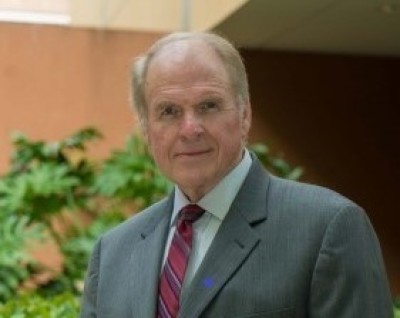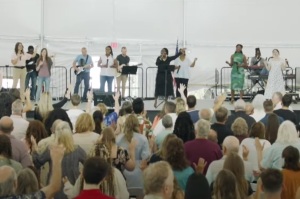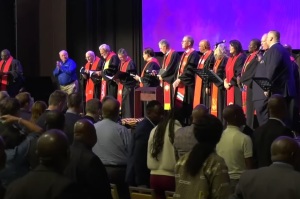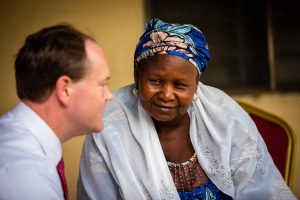Processing and profiting from failure: A ‘Nuremberg trial’ (pt 1)
Behind every catastrophic leadership failure, there is a catastrophic decision that seems irrecoverable and irresolvable.

I know, because I experienced what seemed at the time catastrophic failure at the outset of my career.
In 1965, against godly counsel, with my young wife and infant daughter in tow, I left Fort Worth, Texas, and Southwestern Baptist Theological Seminary where I was a second-year student, to become pastor of an English-language church in Nuremberg, Germany.
The University of Erlangen was nearby. I hoped to continue my studies there. I concluded the move had to be God’s will. After all, I had been impressed to take two years of German in college, and here was a way for me to earn a living and study in Europe.
It had to be a “God-thing.”
All I needed now was the faith to step out.
Yet within four months I would have my own “Nuremberg trial” in the city famous as the location for the Nuremberg Trials of Nazi war criminals.
I had confused my own ego and adventurist impulse for the will of God.
I calculated everything except the Gulf of Tonkin Resolution passed by the U.S. Congress almost a year before, authorizing President Lyndon Johnson to commit America to fight in Vietnam without a formal Declaration of War.
The church in Nuremberg consisted mostly of American soldiers and their families. As our little family was arriving in Nuremberg, U.S. soldiers were getting orders to leave.
Finally, the one deacon in the congregation told me that the small remnant would not be able to continue paying us. Thankfully, we had enough in our personal account to get us home — when combined with a loan from a family member.
On April 1, 1966, we left a snowy day in Germany and many hours later, after stops in Iceland and New York, landed in a warm and bright spring day in Alabama.
But there was no brightness in my soul.
As I walked down the jetway I steeled myself, knowing our relatives would be justified to say, “We told you so.” Instead they extended grace, some of them even allowing us to move in until we could get on our feet.
But that did not stop hard questions barraging me from my own confused, humiliated psyche.
Loved ones had forgiven me, but what about others? What about my reputation... my education? (I returned to seminary decades later and graduated with a Master’s Degree)... my calling and career?... God’s will about which I had been so certain? How would I overcome my shame? Had my faith been too weak? How could I trust myself and my motives in the years to come to truly follow the leadership of the Holy Spirit?
From my perspective I could see only catastrophic failure: I had let down my young wife and baby, our extended family, the church and entire fellowship of churches I had gone to Germany to serve, the people in the United States who had given generously to help fund our original move to Fort Worth and seminary, and the excellent church in that city where I was privileged to serve as youth pastor.
Above all, I thought I had let down the Lord, and He was probably through with me.
Within three days back in Alabama, I took a job in a box factory. One afternoon as I swept the manufacturing room floor, I looked at the big college ring on my finger wrapped around the broom. I decided to quit wearing it. My wife had worked hard for me to attend college and buy that impressive piece of jewelry. It broke my heart to think I had spent those years in college only to become a floor-sweeper in a factory.
Yet I was on the verge of learning lessons that would shape my destiny. I will share some of them with you in the installments ahead in this series.
The greatest one that still carries me is this: God not only redeems persons within the times, but He redeems the times through the person.
“See that you walk circumspectly, not as fools but as wise, redeeming the time,” writes Paul. (Ephesians 5:15-16) “Redeem” is the same word used for freeing a slave. “Time” is the Greek word, kairos, God’s “opportune time” in contrast to kronos, mere finite time. This transformation of the “times” and the individual living through it happens as we walk “circumspectly,” thoughtfully, with God and His purposes in mind.
Transformation does not happen passively, but as we do as Paul — “press forward.” (Philippians 3:14) We are to walk circumspectly, not sit and mope.
For me, this meant doing whatever job I could to support my family, and casting myself on the promise of Romans 8:28, that God would work all the rigors of my “Nuremberg trial” into something good — that He would transform that failure-laden kronos into the kairos of destiny.
It took a while before I could comprehend and walk out on that promise.
To grasp this personally we must get the view from way up the slopes of kronos-time to a certain level on what I call “Mount Hoary.”
The good news is that the higher you go the clearer things get... if you don’t let your catastrophic failure lead you away from God, and if you keep climbing Coram Deo, before His face, with your eyes on Him.
Fog will sometimes cloak your vision of the Lord, weariness will try to overwhelm you, and occasionally you will trip and slide back down the rugged terrain over which you have just hauled your exhausted body, but if you stay on the journey the moment will come when you crest a peak and have the panoramic perspective of the whole journey.
We will learn more about this climb up “Mount Hoary” in Part II.
Wallace Henley is a former pastor, White House and congressional aide, and author of more than 25 books. His newest is Two Men From Babylon: Nebuchadnezzar, Trump, and the Lord of History, published by Thomas Nelson.





























